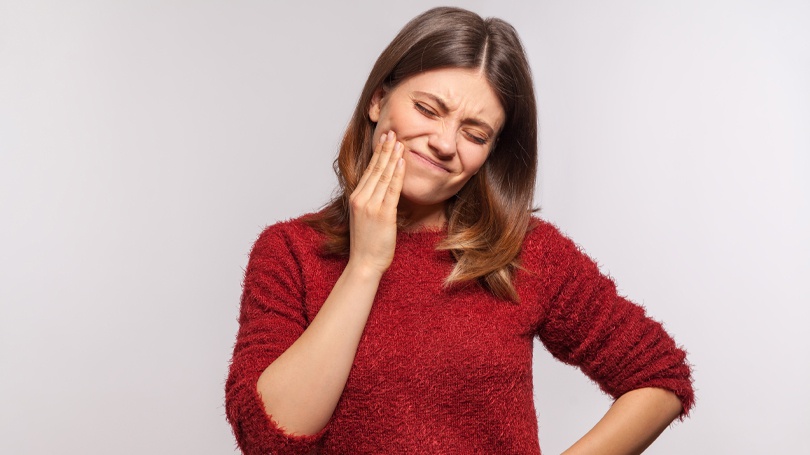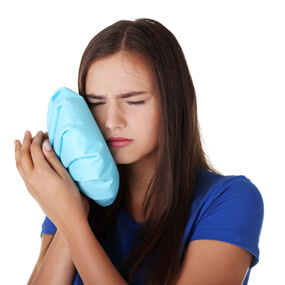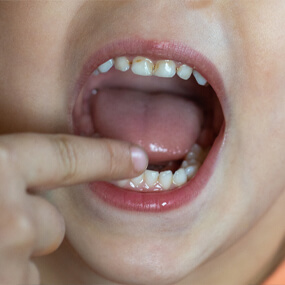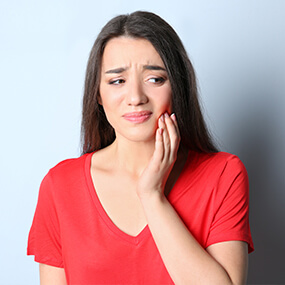Bruxism: Causes and Management of Teeth Grinding

If you often wake up feeling unrested and perhaps with headaches, sore teeth, or a stiff jaw, it could be an indication of sleep bruxism. Bruxism is a parafunctional activity that involves excessive grinding of the teeth or clenching of the jaw. Nocturnal bruxism occurs during sleep, which often means that people are unaware of their condition. Awake bruxism, on the other hand, is less common, considered to be semi-voluntary, most prevalent in women, and often a response to stress. Either form of the condition can occur at any age and can substantially affect your oral health if left untreated.
Nocturnal and Awake Bruxism
Bruxism can affect you at practically any time of the day, but when it occurs matters in regard to both the diagnosis and the treatment. In other words, awake bruxism and nocturnal bruxism are distinct from a clinical perspective. A person with awake bruxism is fully conscious, while the clenching or grinding is occurring. The activity is unintentional, but the person is still generally aware it is happening. Nocturnal bruxism can occur at any point throughout sleep and is often rhythmic. It is often characterized by tight clenching of the jaw, which may be accompanied by grinding of the teeth. Although nocturnal bruxism may not wake you, it can disrupt your sleep and lead to various oral health issues.
What Causes Teeth Grinding?
Possible causes, according to the Bruxism Association, are:
- Stress
- Anxiety
- Alcohol
- Caffeine
- Depression
- Tobacco use
- Sleep disorders
While there is no scientific evidence directly associating particular causes to the condition, statistics reveal that it is much more common in people who snore, have obstructive sleep apnea (OSA), smoke, or heavily consume caffeine or alcohol. It is believed that stress and anxiety are the leading causes in as many as 70 percent of bruxism cases, and a number of studies have shown a higher prevalence among police officers and people in other fields associated with stressful work environments.
What Are the Effects of Teeth Grinding?
The Bruxism Association estimates that people who grind their teeth are three times more prone to headaches. Other common symptoms include sore teeth, jaw discomfort, earaches, neck and shoulder stiffness, and other muscle aches. Over time, facial muscles can become enlarged, disorders involving the TMJ can occur, and various sleep disorders can develop. The teeth also suffer from unnecessary ongoing wear, and this wear can eventually lead to dental damage and even loss of teeth.
How Is Nocturnal Bruxism Diagnosed?
Bed partners and roommates are often the first to alert a person with nighttime bruxism since they hear the grinding, clenching, or even snoring. If someone tells you that these activities are happening in your sleep, you should schedule an appointment with your dentist as soon as possible.
A dentist can often identify the scarring on your teeth and diagnose teeth grinding with no input from the patient. However, these scars develop over time, so it is best for you to be proactive. If you are experiencing unexplained headaches and tiredness along with soreness in your teeth, jaw, ears, neck, shoulders, or just generally around your face, you should discuss these issues with your dentist. Your dentist can then perform a more comprehensive examination to determine if teeth grinding is occurring. Such exams often include dental X-rays to reveal internal damage caused by repetitive trauma.
Can You Stop Nighttime Teeth Grinding?
It depends on what is triggering the grinding. If you are grinding your teeth due to obstructive sleep apnea, then the grinding is likely to cease when the OSA is treated. If the grinding is a stress response, it may be possible to stop the activity by managing the stress. Here are some self-care tips that can help:
- Quit smoking and using other tobacco products.
- Avoid chewing gum and any unnecessary chewing that can stress the jaw muscles.
- Avoid hard and dense foods, such as candies, nuts, pretzels, and steaks.
- Avoid drinking coffee seven hours before your bedtime.
- Minimize your alcohol consumption and avoid alcoholic nightcaps.
- Stay hydrated. Sip water throughout the day whenever you feel a touch thirsty.
- Regular exercise is an amazing way to manage everyday stress.
- You can also manage stress with breathing exercises, meditation, yoga, and so forth.
- Deep breathing exercises are particularly effective as part of a bedtime ritual.
- When bruxism is stress-related, professional counseling has proven effective.
- You should share your stress, anxieties, and frustrations with those close to you.
- Note your stress triggers and work to avoid or at least minimize them.
- Heat therapy is an effective way to manage the facial soreness caused by bruxism. The heat also penetrates the underlying muscles, loosens them, and makes them less prone to tightening.
- Avoid engaging in activities that stimulate you physically, mentally, or emotionally just prior to bed.
- It is generally not recommended for people with nocturnal bruxism, insomnia, OSA, and other sleep disorders to work in bed because you can subconsciously make a stress association.
- Likewise, you should avoid television or using your phone or tablet before going to bed.
- Not all sensory stimulation is bad, however. Listening to calming music or nature sounds in the lead-up to sleep has proven effective in minimizing symptoms associated with many sleep disorders.
- A warm shower or bath prior to bed can relax you and help you get to sleep easier.
- Reading in bed can be a relaxer for some people but not all. Choose what you read with care, and take note of whether it is easing you into sleep or actually keeping you up.
How Do You Treat Teeth Grinding?
Treatment depends on the cause. Your dentist will perform a comprehensive and personalized evaluation and depending on the health issues involved, he or she may need to coordinate with other specialists, such as a sleep medicine specialist. Three common treatment options are:
- Occlusal Appliances – Occlusal appliances are among the most effective way to protect your teeth from wear as well as more serious damage. These appliances have many different names, including night guards, bite plates, occlusal splints, occlusal bite guards, and so on. Each appliance is custom-made to the individual and designed to fit optimally over the upper and lower teeth. Wearing an occlusal appliance during sleep protects your teeth and temporomandibular joint and avoids muscle stress, and the custom fit ensures that the guard holds up much longer than a generic mouthpiece would.
- Mandibular Advancement Devices – Mandibular advancement devices are similar to occlusal appliances in that they are personalized to the individual and designed to fit over the top and bottom teeth. However, they are different in that they are designed to maintain the jaw forward and the tongue in an optimal position. Such devices are often prescribed when a sleep disorder is causing the grinding. Since the device keeps the airway open, it is effective for treating snoring and sleep apnea in addition to bruxism.
- Behavioral Modification – If stress or an anxiety disorder is what causes your bruxism, behavioral modification is generally required to overcome it. Terms like behavioral management are broad and cover everything from relaxation techniques to seeing a therapist. What your behavioral management will entail will depend specifically on what is causing your stress and how you are dealing with it. Some people have had great success with hypnosis, and the Bruxism Association even promotes it as an effective option. Often, patients must also wear an occlusal appliance permanently or at least until the behavioral modification is complete.
Overcome Your Teeth Grinding
If you experience any of the symptoms discussed above, you should schedule an appointment with Jeffrey D. Clark, DDS, as soon as possible. In order to treat clenching or grinding, you need a comprehensive evaluation by a dental professional, which Dr. Clark will conduct. Following the exam, Dr. Clark will discuss your options, including occlusal appliances and mandibular advancement devices. Schedule your exam at Scottsdale Cosmetic Dentistry Excellence today by calling us at 480 585 1853.




